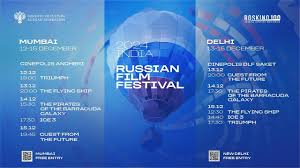
Ice 3, Review: Russian film festival’s six-pack of ice
While Mumbaikars were still mulling to dig into their winter-wardrobe, the Russian Film Festival laid out the white carpet, with huge sheets of ice several kilometres long, for the film was set in the freezing north. Mumbai’s winter would make us blush when compared to North Russia, where the temperatures can be much lower 0 degrees Celsius. This was of course, with solid reason. The fifth of their six-film package, Ice 3, was set in an area where the primary sport for women is figure skating on a deep layered ice-rink. The name gave away the theme, but the suffix 3 aroused curiosity. Search engines lead you to then discovery that the film is a continuation of the stories Ice (2018) and Ice 2 (2020), its predecessors. All three films had different directors breaking the ice. I have not seen its predecessors, but Ice 3, the final part, is a welcome addition to the franchise. An emotional seesaw, set against the figure skating championships, it will bring a lump to your throat, on many an occasion, and have your heart beating as fast as the skaters pirouetting on screen.

In this part, which can stand alone for a viewer who has not seen the previous two outings, we see the coming-of-age story of Nadia, the daughter of Alexander Gorin, as she navigates key moments, in her life leading up to her 18th birthday. After her father suffers a career-ending injury, Nadia refuses to give up on her dreams of becoming a figure skating champion. Despite her father’s prohibition against training, due to the substantial injuries she has suffered in early training, she secretly trains with Sergei Orlov, an ice hockey player who has been transferred to this remote club, who helps her prepare for a prestigious award her mother once desired.
Initially at odds, Alexander eventually approves of Nadia and Sergei's relationship after recognising Sergei’s serious intentions. Although she is supposed to be training with another trainer, Tamara Bezhanova, who was then training her protegée Albina, who was tipped to win the championship. Tamara gave very little attention to Nadia, but she found a soul-mate in Sergei. Secretly, Irina gives tips to Sergei from her hospital bed, which he passes on the Nadia, as his own tips. Irina was Nadia’s coach, till she was diagnosed with terminal cancer, but miraculously survived. With this ‘feedback’, she is able to clear all the hurdles in the championship and beats Albina.

As many as four writers have worked on the script, and they do not include the director: Andrey Zolotarev (major contribution), Aksinya Borisova, Aleksandr Andryushchenko, Oleg Malovichko. That can cause some complications, but the director, Yuri Khmelnitsky has blended their inputs so well that the whole films unravels at a continuous screenplay. Shot mostly on Lake Baikal, a rift lake that is the deepest lake in the world. The Lake is situated in southern Siberia, Russia between the federal subjects of Irkutsk Oblast to the northwest and the Republic of Buryatia to the southeast. Ice 3 was shot at a time when the ice is crystal clear and there are no humans within a kilometer radius.
Very cleverly, the director has kept the back story to minimum and there is only a token apparition of Nadia’s mother in the hospital, where she is presumed dead, by Nadia’s mother tells her that her time has not come yet. The way in which the romance develops between Nadia and Sergei is an example of the control the director has on such importan